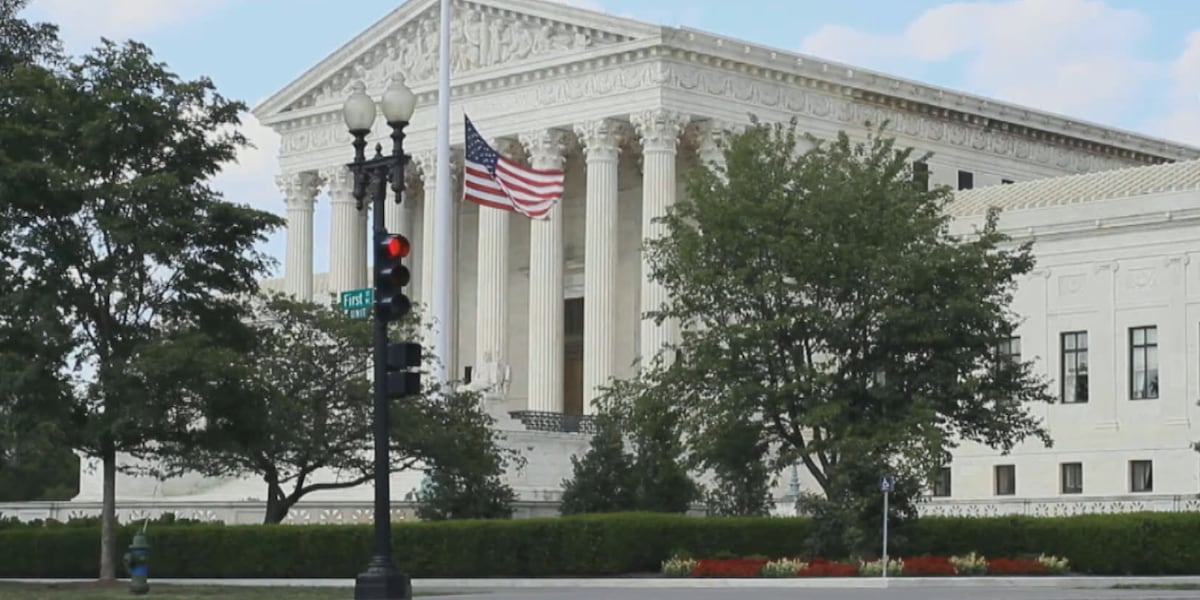Rhode Island
She’s running for U.S. Senate and is trying to ban gender-affirming care for minors in RI
Gender-affirming care for minors banned despite Ohio governor’s veto
Ohio’s GOP-dominated senate voted to ban gender-affirming care for minors and bar transgender women and girls from competing on sports teams.
Straight Arrow News
PROVIDENCE – For Republican state Rep. Patricia Morgan, gender-affirming surgery or treatment for minors, and the participation of transgender athletes in school sports, are issues on which to mount a U.S. Senate campaign.
In an email recently sent by her campaign, Morgan, R-West Warwick, flagged a hearing taking place Tuesday on her legislation to ban – and prohibit the use of public funds for – “gender reassignment” treatments for minors. It would also require minors currently taking “puberty-blocking drugs or cross-sex hormones” to stop doing so by Jan. 1, 2025.
Morgan, who hopes to replace incumbent U.S. Sen. Sheldon Whitehouse, wrote in her email: “Activist educators and health care workers, driven more by ideology than by genuine concern for well-being, are targeting our children.”
Rather than offering “proven therapeutic interventions” to children struggling with mental health, their self-image and their family situations, Morgan argues that “ideologues offer a dangerous and deceitful promise: that all their problems can simply be medicated or surgically cut away.”
What do the bills do?
The West Warwick legislator and two of her House Republican colleagues – Reps. Brian Rea and Robert Quattrocchi – have dubbed their bill, H7884, the “Rhode Island’s Children Deserve Help Not Harm Act.” It’s one of two gender-related bills they sponsor that will be considered by House committees this week.
The first bill:
- Bans any “gender-transition procedures” and hormone therapies on those under the age of 18.
- Opens any doctor who performs such procedures to civil suits and discipline by the state’s medical licensing board.
The second bill, called the “The Fairness in Women’s Sports Act” (H7727), will be heard Wednesday in the House Education Committee and would:
- Ban “students of the male sex” from women’s or girls’ sports.
- In the event of a dispute, require a doctor’s note attesting to the student’s sex based on the “student’s internal and external reproductive anatomy,” hormone levels and genetic makeup.
Why is Morgan sponsoring the bills?
First up in the House on Tuesday is a hearing by the House Health & Human Services Committee on the gender-transition bill that has already drawn a heavy stream of comments for and against the legislation.
In an interview Tuesday, Morgan told The Journal that about two dozen parents have told her they believe their children – or others they’ve heard about – are being “manipulated” into seeking gender-affirming treatments.
She cited a pending malpractice lawsuit against the Thundermist Health Clinic by a former patient who alleges she was in “unstable psychiatric condition,” with eight distinct personalities, when she sought and received “transgender affirming treatment” from agenda-pushing doctors at the clinic.
But despite sending an email blast from her campaign account on the bills, Morgan says the issue is not central to her platform.
“No, it’s not going to be the thing that I base my run for the U.S. Senate on,” Morgan said. “But I do still think that it’s a very important issue that we must tackle to protect children.”
“Parents are being manipulated, emotionally blackmailed into agreeing to give their children puberty-blockers by this statement: ‘Do you want a dead child or a child with a different gender?’” she continued.
More: State Republican lawmaker Patricia Morgan is quietly running for the U.S. Senate
Testimony in favor of the bill
- “Please pass this bill,” wrote David and Theresa Casale of Lincoln. “What is being done to this generation of children is a disgrace. Evil is only way to describe it.”
- “This bill is not anti-trans; it’s pro-child. It’s about recognizing that children cannot, and do not, have the capacity to give informed consent to life-altering medical procedures. It’s about protecting them until they are of an age where they can make these decisions with a full understanding of the consequences,” wrote Kimberly Trow of Coventry.
- “Children do not have the mental capacity, especially when they are in crisis, depressed, suicidal or just angry at their parents or the world, to make the kind of alterations to their bodies that this bill would prevent. Allow them to make these crucial decisions as adults,” echoed Laura Rom of Charlestown.
Testimony against the bill
Most, though not all, who opposed the bill acknowledged a personal connection to the population it would affect.
- “My name is Eliza and I’m a cisgender, queer freshman in high school with many trans and genderqueer friends. Do not let H7884 pass. Many people close to me have not been able to access gender-affirming care, and for those who have had access to it, it has improved their mental health tremendously. If anything, we need more access to this life-saving care. Yes, life-saving. I have been extremely close to losing multiple transgender friends to suicide after their depression and dysphoria fed off each other,” the teen wrote.
- Writing as the “proud parent of a bright and beautiful transgender teen, Amber Ward, of Bristol, urged “swift and decisive action” to dispense with this “hateful and deeply harmful anti-transgender legislation.” “I appeal to your decency and your humanity,” she wrote the legislators. “It is well and credibly documented that anti-LGBTQ+ laws and policies adversely impact the mental health of youth.”
- And finally, Alice Kasumi Ellis, of Woonsocket, wrote as “someone who is a transgender woman and was prescribed Estradiol(Estrogen) and Spironolactone, an anti-androgen, at the age of 15 in conjunction with common medical practices for the treatment of Gender Dysphoria.” “In fact I would most likely not be alive today without receiving such treatment at that time in my life,” she wrote. “What contributes to struggles with my mental health are not [Hormone Replacement Therapy] or Puberty Blockers, but the exact societal stigma and bigoted language in this bill and others of its ilk that makes me feel alienated from society and afraid for my safety due to the constant harassment and violence I have personally faced, along with that of my community.”

Rhode Island
U.S. Senate Dems launch renewed push for full marijuana legalization • Rhode Island Current

Leading U.S. Senate Democrats reintroduced a bill Wednesday to remove marijuana from the list of federal controlled substances, following the Biden administration’s move a day earlier to significantly ease regulations on the drug.
Senate Majority Leader Chuck Schumer of New York, Senate Finance Chairman Ron Wyden of Oregon and Sen. Cory Booker of New Jersey, on Wednesday at a press conference applauded the Justice Department’s announcement it would move marijuana from Schedule I to Schedule III under the federal Controlled Substances Act.
But they said it didn’t solve problems, including race-based discrimination, created by federal prohibition.
Instead, they promoted a bill that would remove cannabis from the Controlled Substances Act entirely, while adding new federal regulations and oversight.
The bill “will help our country close the book once and for all on the awful, harmful and failed war on drugs, which all too often has been nothing more than a war on Americans of color,” Schumer said. “In short, our bill’s about individual freedom and basic fairness.”
Most Americans believe cannabis should be legalized, Schumer said.
The move announced Tuesday by the Justice Department and Drug Enforcement Administration will ease some of the harshest restrictions on marijuana use under Schedule I, which lists the most dangerous and easily abused drugs without any medicinal value.
Schedule III drugs, which include Tylenol with codeine and anabolic steroids, are allowed to be studied and dispensed under certain guidelines.
DOJ move not enough, Dems say
The Tuesday announcement from the Justice Department didn’t go far enough, the trio said at a Wednesday press conference, and should be seen as a potential launching pad for further reforms.
“We want to disabuse people of the notion that because the White House moved yesterday, things are at a standstill here in the United States Congress,” Wyden said. “I look at this as a chance to get new momentum for our bill, for action on Capitol Hill.”
Fifteen other Senate Democrats have cosponsored the bill.
Communities of color and small businesses
The senators said that federal prohibition, even as many states have legalized medicinal or recreational use, has disproportionately harmed communities of color.
“I think it’s a great step that the Biden administration is moving in the direction of not making this a Schedule I drug — the absurdity of that is outrageous,” Booker said. “But honestly, the bill that we are reintroducing today is the solution to this long, agonizing, hypocritical, frankly unequally enforced set of bad laws.”
Federal prohibition has also blocked tax breaks for marijuana-related businesses, including small independent enterprises that Wyden, who chairs the tax-writing Finance Committee, said he is eager to help.
Wyden said he was excited about a provision in the bill to allow state-legal marijuana business access to a common tax break that allows small businesses to deduct business expenses.
With marijuana classified as a Schedule I substance, the federal tax break has not been allowed even for businesses that operate with a state license. Wyden said that small independent businesses “really get clobbered” under the current system. He indicated that his committee would look at more ways to reduce the tax burden for “small mom-and-pop” businesses.
The senators did not answer a question about if the legalization bill should be considered in tandem with a separate bill to allow state-legal marijuana businesses greater access to the banking system. Many banks refuse to do business with marijuana businesses out of fear they will be sanctioned as an accessory to drug trafficking.
New regulatory framework
The bill would automatically expunge federal marijuana-related convictions, direct the Department of Housing and Urban Development to create a program to help people who lost access to housing benefits because of marijuana convictions and establish a Cannabis Justice Office within the U.S. Justice Department.
It would direct funding to an Opportunity Trust Fund to help people and individuals “most harmed by the failed War on Drugs,” according to a summary from Schumer’s office. It would disallow possession of cannabis to be used against any noncitizen in an immigration proceeding and prevent withholding of other federal benefits from people who use the drug.
While the bill would remove cannabis from regulations under the Controlled Substances Act, it would add new federal oversight, making the Alcohol and Tobacco Tax and Trade Bureau the federal agency with jurisdiction over the drug.
The bill would establish a federal Center for Cannabis Products to regulate production, sales, distribution and other elements of the cannabis industry, instruct the Food and Drug Administration to establish labeling standards and create programs to prevent youth marijuana use.
It would also retain a federal prohibition on marijuana trafficking conducted outside of state-legal markets, ask the Transportation Department to develop standards on cannabis-impaired driving and have the National Highway Traffic Safety Administration collect data and create educational materials on cannabis-impaired driving.
GET THE MORNING HEADLINES DELIVERED TO YOUR INBOX
Rhode Island
REAL ID Deadline Is On The Horizon: What You Need To Know In RI

RHODE ISLAND — The countdown is on for Rhode Island residents who haven’t gotten their REAL ID cards. After moving the deadline for getting the gold star required to board domestic flights and certain federal offices, Homeland Security officials set May 7, 2025, as the final date.
COVID-19 backlogs in state agencies charged with issuing driver’s licenses and identification cards prompted the last REAL ID extension in late 2022. The original 2020 deadline to get REAL IDs had been extended multiple times because of the pandemic.
After May 7, 2025, federal agencies, including the Transportation Security Administration, will no longer accept identification that does not meet the new standards.
The REAL ID Act of 2005 was passed by Congress in response to the 9/11 terrorist attacks. In addition to the stars, REAL ID cards are built with technology that makes them more difficult to forge, according to the Department of Homeland Security.
Rhode Island residents who don’t plan to fly domestically or visit a federal office don’t need to do anything. A REAL ID isn’t required to get a driver’s license. Also, the TSA won’t require children under 18 to provide identification when they’re traveling with an adult companion within the United States, but the companion must have acceptable identification.
The REAL ID is not a substitute for a passport required for international travel, and it also does not affect the ability to vote or register to vote, applications for federal benefits, enter federal facilities that don’t require identification, obtain medical care, or participate in police proceedings or investigations.
Have a news tip? Email jimmy.bentley@patch.com.
Rhode Island
New Brass. 10 Rhode Island police chiefs sworn in over the last year.

Thirty-seven police chiefs command the local police officers who work in Rhode Island’s cities and towns.
Twenty-one of those chiefs took their oaths less than five years ago.
Fifteen were sworn in less than three years ago.
The count rises to 16 if the grouping of city and town police chiefs is expanded to include the superintendent of the Rhode Island State Police: Col. Darnell S. Weaver took his oath in April 2022.
Of course, neither Weaver nor his counterparts in the cities and towns are newbies to law enforcement. Most logged many years of experience as lower-ranking police leaders before they took the reins of their respective organizations.
But being first-in-command is different. And the number of newcomers to the chief rank, including 10 chiefs who were sworn-in less than two years ago, has been noticed at monthly gatherings of the Rhode Island Police Chiefs’ Association.
The executive director of the Rhode Island Police Chiefs Association, Sidney Wordell, said he can’t recall another time when Rhode Island had so many new police chiefs.
“No doubt, we’ve seen a turnover of chiefs that I have never seen before,” said Wordell, himself a former Little Compton police chief who has been YYYat the association for nine years.
The sheen of retirement
A collection of societal trends and economic factors have played into the recent wave of departures, according to Wordell.
A big influence, he says, involves the economics that have made it harder for employers everywhere to hold onto employees in general.
Even police chiefs, with less experience in the job, have management skills that can be desirable to employers, Wordell said.
In recent years, at least five police leaders in Rhode Island have shifted from law enforcement to work jobs as town administrators.
The environment for police work itself has been full of new challenges in recent years, from scrutiny and pressure brought by social justice activists, to enormous technological change to safety threats related to the willingness of some Americans to kill other people, including police officers, with high powered rifles such as the AR-15.
Chiefs also face more adversity in recruiting police officers.
All of these factors can put a different sheen on moving to a different occupation or retiring sooner rather than later.
On a certain level, Rhode Island has entered a new era, according to Wordell. The time when certain chiefs, police leaders like former Johnston police chief, Richard S. Tamburini stay in the job for more than 25 may be over.
“It’s unheard of,” Wordell said.
The sage veterans
Rhode Island’s most experienced police chief is Middletown Police Chief Anthony Pesare.
Pesare logged 18 years as Middletown’s chief before he left the force in 2018.
In February 2023, Pesare returned to lead the force after the departure of Chief William Kewer.
Only eight other police chiefs, in addition to Pesare, are still leading their departments after taking over more than 10 years ago.
Cranston’s police chief, Col. Michael J. Winquist, who swore his oath in October of 2014 — after a lengthy state police career — is in the next group of top police leaders.
Both Narragansett Police Chief Sean Corrigan and Woonsocket Police Chief Thomas F. Oates III are close behind Winquist.
What are more experienced chiefs doing to help newcomers?
Oates, who served as a deputy chief in Providence for many years before his appointment in Woonsocket, has noticed new faces at the association’s monthly gatherings.
The association has scheduled some special sessions that are specifically geared to help provide some orientation to new police chiefs.
Oates said he has closely coordinated with the new chief in neighboring Cumberland, Chief Matthew Benson as Benson has settled in.
All of the chiefs have worked together on projects such as the adoption of body cameras at departments across the state.
Such contact can help them handle crises, togeher, too, Oates said.
“It’s great,” he said.
Chiefs who were sworn in back before the pandemic started, more than four years ago, are in the next group behind Oates. They are Tiverton Police Chief Patrick Jones; Pawtucket Police Chief Tina Goncalves; Charlestown Police Chief Michael J. Paliotta; Little Compton Police Chief Scott N. Raynes; Portsmouth Police Chief Brian P. Peters; and, Bristol Police Chief Kevin Lynch.
Police chiefs of the 2020s
Chiefs who were sworn in more than three years ago, during the early pandemic era, include Coventry Police Chief Frederick J. Heise III; North Smithfield Chief Tim Lafferty; Central Falls’ police chief, Col. Anthony J. Roberson; Scituate Police Chief Eric C. Rollinson; Warren Police Chief Roy M. Borges; and, Warwick’s police chief, Col. Bradford E. Connor.
East Providence Police Chief Christopher Francesconi; West Warwick’s police chief, Col. Ernest Lavigne; and, North Providence Police Chief Alfredo Ruggiero Jr. were sworn in on the back end of the pandemic in 2021, more than two years ago.
South Kingstown Police Chief Matthew C. Moynihan took his oath less than two years ago in June 2022. But prior to that, in 2021 and 2022, the former state police veteran had led Block Island’s police force.
Rhode Island’s newest police chiefs
Benson in Cumberland, Westerly Police Chief Paul Gingerella, and Weaver were sworn in about two years ago.
Both Newport Police Chief Ryan G. Duffy, and Providence Police Chief Oscar L. Perez Jr. are now leading police organizations in two of Rhode Island’s largest cities after taking their oaths less than two years ago.
Johnston Police Chief Mark A. Vieira also took his oath last year in January. Several months later, Vieira had one of the busiest days of his career when a Simmonsville man shot and killed his own mother. The same man also shot and killed a 44-year-old neighbor and he shot a teenage neighbor before he died in a confrontation with Cranston and Providence police.
Three Rhode Island chiefs took their oaths within the past year: They are Foster Police Chief Gina Lindell, Lincoln Police Chief Dennis Fleming, and Jamestown Police Chief James Campbell.
New Shoreham Police Chief Paul Deane was sworn in on Block Island in February and Hopkinton Police Chief Mark Carrier became a chief in early March.
Newest of new
After serving as an acting chief for a period, North Kingstown Police Chief John J. Urban Jr. took his oath on March 27, rising to become the state’s newest police chief.
Urban, a 22-year police veteran who also served in Iraq with the Rhode Island National Guard, became North Kingstown’s acting chief in September.
He is optimistic about the prospects for a turnaround in recruiting and he has his own strategy for dealing with the many changes of the current era. Flexibility is key, he said.
Urban also recognizes that a certain leader might reach a point where providing flexibility isn’t possible.
“Then you have to go,” he said. “I say it all the time, we are just pictures on the walls.”
North Kingstown, said Urban, will have a police force long after he is gone, and, for that matter, long after his children, and their children, are gone.
“That’s just the facts,” he said.
-

 Education1 week ago
Education1 week agoVideo: Dozens of Yale Students Arrested as Campus Protests Spread
-

 News1 week ago
News1 week agoLarry Webb’s deathbed confession solves 2000 cold case murder of Susan and Natasha Carter, 10, whose remains were found hours after he died
-

 World6 days ago
World6 days agoHaiti Prime Minister Ariel Henry resigns, transitional council takes power
-

 Politics1 week ago
Politics1 week agoFetterman hammers 'a–hole' anti-Israel protesters, slams own party for response to Iranian attack: 'Crazy'
-

 World1 week ago
World1 week agoPeriod poverty still a problem within the EU despite tax breaks
-

 World1 week ago
World1 week agoUS secretly sent long-range ATACMS weapons to Ukraine
-

 News6 days ago
News6 days agoFirst cargo ship passes through new channel since Baltimore bridge collapse
-

 World1 week ago
World1 week agoTurkey’s Erdogan meets Iraq PM for talks on water, security and trade




















